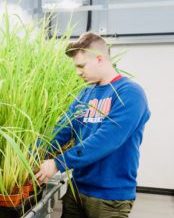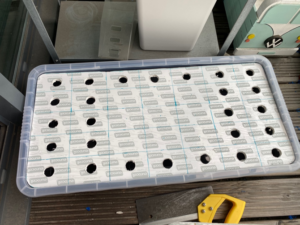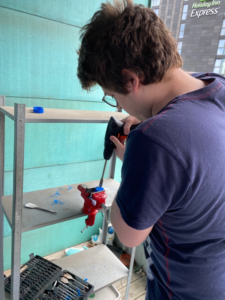This week’s blog post comes from Luke Fountain, a second year WRDTP PhD student (and a UK student space ambassador!) at the University of Sheffield.
Over the past few months of lockdown, like many of us, Luke has been trying to find new ways to stay productive while access to university sites has been restricted. Here Luke shares with you what he has been up to, from building hydroponics set ups from home to attending live Q&As with Astronauts!
Hopefully Luke’s experiences will inspire you to get creative as we slowly find our way back into a new normality.
Staying productive during lockdown – Luke Fountain
As a PhD student, the last few weeks have been an incredible challenge – adjusting to the drastic new lifestyle of working from home has been particularly hard. As a plant scientist, my work relies almost entirely on the growth of plants in order to continue making progress in my research. Since this is not possible under current restrictions (which have been put in place for a good reason), my research has taken a big hit that it will be hard to recover from, and many other PhD students are in the same position.

After a few days of frantically trying to work out what I was going to do to fill my time productively, my focus shifted to other things that I can do to improve my CV and increase my appeal for future career opportunities. A few weeks before the lockdown, I became an approved UK STEM Ambassador and a UK Student Space Ambassador, and I decided to take full advantage of this. There are currently numerous opportunities to volunteer remotely to promote STEM during lockdown, and I have got stuck in with numerous activities (and strongly recommend getting involved!).
As an aspiring astronaut and space plant biologist, I have also spent a lot of time engaging with this field in numerous formats, including webinars for plant scientists working in space (courtesy of Plantae’s online webinar series), numerous live Q&As with astronaut Tim Peake, and of course watching the recent SpaceX Crew Dragon launch. I have also started designing my own outreach activity for schools, centred around growing plants in simulated Martian soils, which I am hoping will eventually work its way into schools. There is a plethora of other seminars, conferences and workshops that have moved online so there is always something new out there to learn and get involved with.

I have also focused on my eventual return to the lab – a lot of time has been lost, and no doubt this will have an effect on my research, but from the start of lockdown I have been doing everything I can to ensure my return to work will be as easy as possible.
My PhD is centred around how plants can manipulate the soil process of nitrification, which is responsible for substantial losses of nitrogen from agriculture. This is a problem for two reasons; nitrogen fertilisers are expensive, so increased losses of nitrogen increase the amount that needs to be applied, which in turn increases costs to the farmer. Nitrification and other associated processes can also produce nitrous oxide, a greenhouse gas more potent than CO2. It is therefore important to control nitrification, from both an environmental perspective and to promote sustainable agriculture.
My work is specifically investigating how plant preference for different forms of nitrogen can influence this process, and my current experiments are identifying conditions under which plants show differences in their nitrogen preference. To do this I use custom-built hydroponics systems, and this is something that can be done at home. I have spent the last couple of weeks making the most of the nice weather on my balcony to build a new set of hydroponics tanks which I am looking forward to using in experiments when I return to the lab.

There is no doubt that the COVID-19 pandemic has had a drastic impact on PhD students, particularly those like me who rely on regular access to laboratories and other specialist facilities to carry out our day-to-day work. But that doesn’t mean that our research has to stop completely, and showing resilience and a willingness to adapt to new and challenging situations are the hallmarks of a good scientist.
